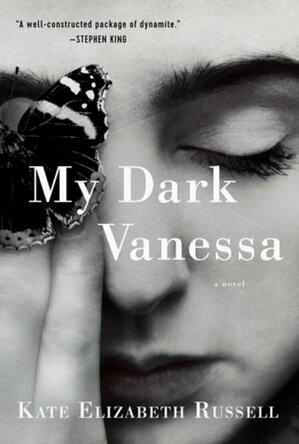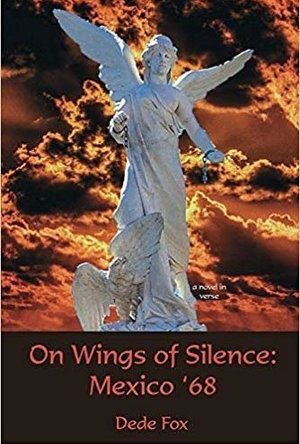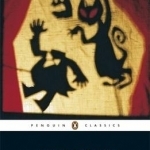Kristy H (1252 KP) rated My Dark Vanessa in Books
Mar 19, 2020
"'I'm going to ruin you.' He says it with obvious torment, a glimpse into how much he's thought about it, wrestled with it."
This book...wow. I was absolutely captivated by Vanessa's story. She tells her tale in two parts: her adolescence, as she meets Jacob Strane at school and they begin their relationship; and then the present, as Taylor Birch's story hits the press and Vanessa must deal with the fact that her love for Jacob Strane is being portrayed as abuse and assault.
"It's strange to know that whenever I remember myself at fifteen, I'll think of this."
For a book with such dark subject matter, it's really beautiful. Russell is a wonderful writer, and this story unfolds almost lyrically. It's so well-done and completely mesmerizing. The sections featuring young Vanessa capture that early adolescent yearning and longing so perfectly--that deep desire to feel needed and wanted. To Vanessa, this is a love story, a romantic tale of a man needing and loving her. She blocks out and overlooks the parts of the story that don't fit. Understanding that some victims don't see abuse as abuse is key to the story, and Russell portrays the dynamic between Strane and Vanessa so well.
"'It's just my luck,' he said, 'that when I finally find my soul mate, she's fifteen years old.'"
As a result, we get a very thoughtful look at abuse, rape, and assault. And, yes, the sections of older Vanessa's story touch across the #metoo movement, as Taylor Birch and others want so desperately for Vanessa to join their side, to share her story. For them or for Vanessa, it's hard to say. This book is so dark, yet so insightful. Vanessa's inner struggle--basically she's having to re-look at the entire foundation upon which her life is built--is one of the most profoundly written and moving journeys I've seen in literature in quite some time. It's not easy to read about, certainly, and it's not always easy to understand her actions, of course. The story can make you uncomfortable; it can feel problematic. But it's an important read, and it's so beautifully and poetically written. I highly recommend it (taking into account the obvious trigger warnings, of course). 4.5+ stars.

The Man Who Walked Through Walls
Marcel Ayme, Sophie Lewis and Yann Kebbi
Book
A collection of funny and fantastical short stories, Marcel Ayme's The Man Who Walked through Walls...
Heather Cranmer (2721 KP) rated On Wings of Silence: Mexico '68 in Books
May 6, 2019
I will admit that I had never heard of the Tlatelolco Massacre before I read On Wings of Silence: Mexico '68. The plot does a fantastic job of explaining the massacre to those who know nothing about it. It was also interesting to read about Diana's time in Mexico as an American university student. Everything is told through Diana's perspective. This book made me want to research more about the Tlatelolco Massacre that the Mexican government tried to keep hushed up.
The prose in On Wings of Silence: Mexico '68 was done beautifully and perfectly. Every word elicited all kinds of feelings whilst reading this book. Because this novel was written in verse, it really drove those feelings home and made them feel more realistic. I think I experienced a total spectrum of feelings while reading On Wings of Silence: Mexico '68. Some readers may have a little trouble with some of the Spanish in this book, but there are enough context clues to figure out what is being said.
I really cared and felt for Diana, the main character in On Wings of Silence: Mexico '68. Diana was such an authentic and fleshed out character which can sometimes be a challenge in books written in verse. Dede Fox made character writing appear easy! My heart felt so full while Diana was falling in love with Guillermo. I felt as if I was falling in love at the same time. When Guillermo went missing while on the phone with Diana, I felt such panic. Her search for her boyfriend felt as if it was my search. I was worried for Guillermo as if he was a real person instead of a fictional character. (Sadly, as this book is based on an actual historical event, I imagine that feeling was all too real for many people.) I lived in hope Guillermo would turn up at some point. I'll just leave it at that because you'll have to read the book in order to find out Guillermo's fate. Diana was such a strong female character as well. I really admired her. Natalie and Melinda, Diana's roommates, were likable characters, but we don't get much of a backstory on them. I feel as if this was done on purpose so the reader could really focus more on Diana's story.
The pacing was done fantastically! I devoured this book in one sitting. I couldn't get enough. Each word flowed beautifully into the next, and I was left captivated and hungry for more of the story.
Trigger warnings for On Wings of Silence: Mexico '68 include attempted rape, sexual assault, violence (although not graphic), drinking, some minor profanities in English and Spanish, and political corruption.
Overall, On Wings of Silence: Mexico '68 is a beautifully written piece of literature that will leave its reader with a plethora of feelings as well as a history lesson. I would definitely recommend On Wings of Silence: Mexico '68 by Dede Fox to everyone 16+.
--
(Thanks to the Dede Fox for providing me with a paperback of On Wings of Silence: Mexico '68 in exchange for an honest and unbiased review.)

Read the best books online
Book and Shopping
App
• Read! - a huge library in Estonian, English, Lithuanian, Latvian, Russian and other languages. ...

Die große Wörterfabrik
Book and Games
App
NEW: Now for iPad AND iPhone - You can now install this app on both your iPad and on your iPhone. ...

Radio y Podcast iVoox
News and Music
App
With iVoox you can listen, share and download podcasts, radio shows and much more for free, whenever...
Acanthea Grimscythe (300 KP) rated Let the Right One In in Books
May 16, 2018
Lindqvist has created for readers a completely deplorable cast of characters, ranging from Eli, the child, to her caretaker, Håkan Bengtsson. These characters aren’t hate-worthy in the same manner as Gone Girl‘s Amy Dunne, but rather in the way that they simply are. I won’t go too much into the details behind why I find the cast of this book to be unsavory, because I feel that just about anything I could say about the characters would, in one form or another, spoil the book; these characters and their flaws, which are bountiful, provide the book with so many unexpected twists and turns that just about anything that could be said might reveal something vital to the plot. Except for my favorite character, which, oddly enough, is Gösta. This may or may not have something to do with the fact that, like Gösta, I adore cats and it is extremely difficult for me to not want to take a stray in. (My boyfriend and I have too many, and I love them more than the entire world!)
The plot takes place over the course of about three weeks, beginning near the last week of October and ending on Friday, November 13. For a book of about five-hundred pages, that’s quite a few days to cover and often, that expanse of time, when it is written as detailed as Lindqvist has penned it, can seem like it simply drags on – that is not the case here. As I read, it felt more like a few days than several weeks, largely because the plot is fast paced and constantly moving. Because there isn’t a lot of exposition, there isn’t really much to slow the story down. Told from alternating perspectives, readers are given several different points of view of what’s going on, and from there it is relatively easy to come to your own conclusions regarding the story’s events as well as the behaviors of the various characters. Those I loathed, others might feel pity for, and vice versa.
Let the Right One In is a vampire novel, as I’ve alluded to earlier in this review; however, Lindqvist does not approach the idea of vampires in the same method that many books do presently. These are not romanticized vampires, but rather monsters. Horrible, bloodthirsty creatures that will rip out your throat, not sparkle – that’s what Lindqvist’s vampires are. This fact alone scores extra points with me, because I prefer vampires as the terrors they are meant to be, rather than the glorified, dark lovers that plague most contemporary literature.
My only gripe with this translation of Let the Right One In deals largely with its flow. While the story itself is excellent and the characters dynamic, the translation seemed to be a bit on the rough side. I do not speak Swedish. If I did, I wouldn’t have a use for the translated version of the story. That said, I know absolutely nothing of the language. Given that my major is in Creative Writing and that I have taken Linguistic courses, I do know that some languages have no tense – at least, not in the way that those of us that speak English view it. That said, there are many times in the translation that I was reading where the tense seemed to switch randomly, and I do not know if this was intentional or not. It was not an issue that I encountered while reading The Girl with the Dragon Tattoo though, so it’s a bit hard for me to be forgiving about it.
This book was definitely worth the read, and I’m hoping that I’ll get a chance to watch the original film adaptation in the future – my boyfriend might have it, actually. I should check!
Acanthea Grimscythe (300 KP) rated Let Me In in Books
May 16, 2018
Lindqvist has created for readers a completely deplorable cast of characters, ranging from Eli, the child, to her caretaker, Håkan Bengtsson. These characters aren’t hate-worthy in the same manner as Gone Girl‘s Amy Dunne, but rather in the way that they simply are. I won’t go too much into the details behind why I find the cast of this book to be unsavory, because I feel that just about anything I could say about the characters would, in one form or another, spoil the book; these characters and their flaws, which are bountiful, provide the book with so many unexpected twists and turns that just about anything that could be said might reveal something vital to the plot. Except for my favorite character, which, oddly enough, is Gösta. This may or may not have something to do with the fact that, like Gösta, I adore cats and it is extremely difficult for me to not want to take a stray in. (My boyfriend and I have too many, and I love them more than the entire world!)
The plot takes place over the course of about three weeks, beginning near the last week of October and ending on Friday, November 13. For a book of about five-hundred pages, that’s quite a few days to cover and often, that expanse of time, when it is written as detailed as Lindqvist has penned it, can seem like it simply drags on – that is not the case here. As I read, it felt more like a few days than several weeks, largely because the plot is fast paced and constantly moving. Because there isn’t a lot of exposition, there isn’t really much to slow the story down. Told from alternating perspectives, readers are given several different points of view of what’s going on, and from there it is relatively easy to come to your own conclusions regarding the story’s events as well as the behaviors of the various characters. Those I loathed, others might feel pity for, and vice versa.
Let the Right One In is a vampire novel, as I’ve alluded to earlier in this review; however, Lindqvist does not approach the idea of vampires in the same method that many books do presently. These are not romanticized vampires, but rather monsters. Horrible, bloodthirsty creatures that will rip out your throat, not sparkle – that’s what Lindqvist’s vampires are. This fact alone scores extra points with me, because I prefer vampires as the terrors they are meant to be, rather than the glorified, dark lovers that plague most contemporary literature.
My only gripe with this translation of Let the Right One In deals largely with its flow. While the story itself is excellent and the characters dynamic, the translation seemed to be a bit on the rough side. I do not speak Swedish. If I did, I wouldn’t have a use for the translated version of the story. That said, I know absolutely nothing of the language. Given that my major is in Creative Writing and that I have taken Linguistic courses, I do know that some languages have no tense – at least, not in the way that those of us that speak English view it. That said, there are many times in the translation that I was reading where the tense seemed to switch randomly, and I do not know if this was intentional or not. It was not an issue that I encountered while reading The Girl with the Dragon Tattoo though, so it’s a bit hard for me to be forgiving about it.
This book was definitely worth the read, and I’m hoping that I’ll get a chance to watch the original film adaptation in the future – my boyfriend might have it, actually. I should check!
Sass Perilla (36 KP) rated The Master and Margarita in Books
Aug 9, 2019
Firstly, I didn’t intend to write an essay on this novel. However, once started I found I had a lot to say, and the more I thought about the plot and characters, the more ideas and parallels were sparked, so I am hopeful that the verbosity of this review can be forgiven.
At the risk of sounding both ignorant and uncultured, I found this novel (at least at first) bloody hard slog; not least because the Russian characters have three names, plus a nickname, plus a pun on their name (none of which work particularly well in translation and all of which sound rather similar to the English untrained ear). As an example- Ivan Nikolaevich Ponyrev (who seems to be referred to by any and all of these names) is also known as “Homeless” and “the poet” is a key character in the opening section of the novel. To further demonstrate: there are 17 different names that start with A that are used to refer to 15 different characters with Andreyevich used as the middle name of a bereaved uncle, who makes a journey from Kiev after his nephew is beheaded in a freak tram accident- and Andrey the buffet manager at a Moscow theatre. Clear as mud right? And that is before starting on similarly named characters with the initials M, P, L and S! At my last count there were 45 distinct characters, and I am fairly sure there will be some that I have missed. Hence, I did a lot of re-reading to work out exactly who was doing what to whom.
Additionally, I would suggest you need to be wary of the different translations. The distinct changes in meaning are subtle but important. To triangulate I had three versions at my disposal: Hugh Aplin’s translation (available for free on Kindle), the audiobook version translated by Richard Pevear and Larissa Volokhonsky (which I listened to simultaneously when reading the book to come to my own interpretation, and the subtitles for the Russian TV miniseries from 2005 when I gave up trying to work out who was who from name alone!
So those were my “technical” issues (if you like) with engaging with this novel, and this lack of clarity and understanding (and my own lack of contextual knowledge of Stalinist Russia) meant I missed many of the (what I am sure are hysterically funny to those in the know) satirical jokes in the opening section. That said, the random action and quick changes of focus, undercurrent of chaos in Moscow despite entrenched hierarchal structures and clear threat that (any) one could go missing at any time, for an unclear reason gave a clear insight into the mind and fears of a 1930s Russian citizen. No wonder it was available only in censored form for so long.
Despite these hardships, there were some genuinely laugh out loud moments in the first Moscow based part of the novel. The citizens have not lost their individuality, as they scrabble and fight for bank notes in the theatre, which are later revealed to be worthless. Nor have they lost their sense of pride and vanity, which we see in the female theatre goers, so desperate to attain the fashionable French couture (which later literally disappears from their bodies leaving semi-naked citizenesses desperately trying to cover themselves in a scene reminiscent of “Allo Allo” meets “Benny Hill”). When Professor Woland says his show will “expose” what the locals have failed to realise is that it is their (moral) shortcomings that are about to be revealed. The message is clearly, that no government can successfully legislate against human nature.
Oooh- and another fun fact, apparently Woland (later revealed- or perhaps is implied- to be Satan) was the inspiration to the Rolling Stones 1968 hit “Sympathy for the Devil”, well at least that is what my Google-Fu tells me.
Obviously, there were substantial hurdles to leap, however, I found by the second half of the novel, when we finally meet the eponymous characters, I had got in to the swing of things and begun to embrace the farcical surrealism of the novel.
The second “book” marks a change in tone, although it continues to cut away to scenes of Jesus’ sentencing by Pilate and execution (here known in the Aramaic form Yeshua). Ironically it is these scenes that are the most “real” and substantially human, as Pilate’s decision weighs head achingly heavily on him throughout. The Master and Margarita seem to be the only two characters fully invested in the authenticity of literature, and serve as a counterpoint to the heavily censored “monstrous” writing of Ivan and the rest of the writers’ union Massolit, more interested in fine dining and what their positions can do for them then the production of quality writing.
And it is Margarita’s journey of discovery and liberation from the stodgy, miserable societal expectations of that leads her back to her Master. Bulgakov mixes classical myth, Russian folklore and Bible stories to give us an impression of the timelessness of the central romance. As the worlds of communist Moscow and the inner worlds of the Master and Margarita collide, we are informed of the former’s desire to excuse all magic (and mischief) as the product of mass hypnosis, when the latter (and the reader) are fully aware of the spiritual significance and dimension of the events.
Clever, astute and in places laugh out loud funny, this novel none-the-less requires a level of dedication from the non-Russian speaking reader. Worth a read? Yes. Worth a re-read? Maybe not.
Jordan Binkerd (567 KP) rated Gideon's Angel in Books
Aug 15, 2019
I received my copy of Gideon’s Angel through the Goodreads FirstReads program. This in no way influences my review, except to ensure that I was able to get ahold of this book and thus review it. I have to say, I really enjoyed this one. I want to describe it as “steampunk,” but my understanding is that steampunk is usually set in the 1800s (or at least that level of tech and society) whereas this work is firmly set in 1653. If there’s already a term for pseudo-historical fiction with a fantasy touch set in that timeframe, I apologize for not knowing what it is and using it accordingly.
Things are not going well for Richard Treadwell. The English Civil War is over, the King’s Cavaliers lost to the forces of Parliament and Oliver Cromwell, and Charles I has been executed. Treadwell has managed to escape the destruction of his cause, and has spent the past eight years in exile in France, performing a delicate balancing act between loyalty to his exiled king* and his employer, Cardinal Mazarin. When Mazarin informs him that someone is using the forces of Hell to tip the balance in their favor and asks him to spy on the exile court to find out if it is one of the king’s supporters, Treadwell decides that it’s time to get out of Paris. He accepts a mission for one of the king’s more militant supporters that will take him back to his beloved England–to lead a Royalist uprising, one last try to oust Cromwell and his Puritan cronies. Treadwell has other business to tend to as well, including a wife who by now probably considers herself a widow. Unfortunately for Treadwell’s simple worldview, it soon becomes clear that Cromwell’s power is the only thing preventing the more radical Puritan elements from running roughshod over the whole country. Worse still, a demon from the pits of Hell has appeared to a radical Puritan sect masquerading as an angel of light and ordering the death of Cromwell so that the Kingdom of God may be fulfilled. Now instead of assassinating Cromwell Treadwell will be forced to save him–if he can find a way to fight the forces of Hell, gain some allies in his quest, and avoid d’Artagnan, a young Musketeer dispatched by the Cardinal to bear him back to Paris….
I really enjoyed this book. It’s not exactly “high literature,” but I think I’ve very well established that I care far more about a work’s entertainment value than whatever it is critics look for. The world Beal creates here feels very real, slipping in background historical information without making you feel like you’ve been lectured. Some readers will probably wish for more background on the English Civil War, and that’s fine. If they care that much, there are numerous good books on the subject. If they don’t, there’s a Wikipedia article that should give you a good rundown on what happened. Beal manages to evoke seventeenth-century London in all its grimy glory, much as it would have actually been aside from the fact that all the magic we dismiss as superstition is actually going on behind the scenes. Moreover, this magic very much resembles what you would find depicted in the folklore of the era without obvious modern embellishment. I’m not really all that well versed in the history of the Freemasons, so I can’t accurately speak to how they were portrayed here except to say that I very much doubt their claim to date back to the builders of the pyramids. Then again, I doubt they have the tools to summon demons too, so maybe I shouldn’t be too critical. Secondary characters generally proved to be interestingly complex, especially Billy Chard, but I am seeing criticism of how the female characters in the book act. They aren’t weak characters by any means, but they are constrained by their roles in society. Treadwell’s wife has pragmatically joined her fate to that of the officer who took over Treadwell’s land when he was banished and is pregnant with his child. Is she weak for this? Or is she a strong female doing what she has to in order to protect what is left of her family? Treadwell’s Parisian mistress follows him to England rather than stay in Paris and face the scandal of their liasion alone. Weak, for needing Treadwell by her side? Or strong, for following him into whatever dangers he may be facing? Finally, Isabelle decides to follow her father and the rest of Treadwell’s band into battle against the forces of Darkness, deciding that it would be better to fall by his side than live on without him. Possibly a sign of weakness, but look at her situation realistically. She and her father were driven from Spain for their Jewish heritage, her mother dying along the way. Jews do not fare well in the Christian world of the seventeenth century, not even in England. The lot of a young woman alone in the world is already hard enough in this time without adding the burden of religious and ethnic persecution. She would have no respectable means of supporting herself, and could conceivably find herself forced into prostitution–on her own if she was lucky, as no more than a slave if she was not. Is preferring death in battle to such a fate a sign of weakness or of strength? She certainly has no trouble speaking her mind, and in fact berates Treadwell severely for endangering her father when they first meet. I suppose I can understand where some people would find these characters and their portrayal to be weak and sexist, but I respectfully disagree. I submit that instead they are strong characters reacting realistically to a world where women are not treated equally–in fact, I would have more of a problem with them if they demonstrated anachronistic modern sensibilities.** The ending was a little deus ex machina, but on the whole I didn’t mind. I would say that I want to read a sequel, but I don’t think the author could come up with anything to top this in terms of personal impact on the characters–Treadwell’s internal conflict between hating Cromwell and having to save him is very well done, and I fear Beal would prove unable to find something equally interesting as a follow up. We never really got to find out what happened to Treadwell back during the Thirty Years War that introduced him to the world of angels and demons, so I could see maybe writing that up….I’d buy it, anyway.
CONTENT: R-rated language, occasionally harsh but I would argue not gratuitous. Moderately explicit sexual content, as you would expect from a work in this vein.*** A fair amount of violence, from both man and demon. Not usually too gory in its description. There is also a good deal of occult content, as the villains are summoning a demon they believe to be an angel. This demon’s lesser minions dog Treadwell and his friends, and there are multiple encounters with them. One is implied to be a golem, others appear as strange amalgamations of beast(s) and man. For me, this is adequately balanced by the recognition that, as powerful as the forces of Darkness are, God is far more powerful than they. Bottom line: if you’re mature enough to handle the other content, I don’t believe the occult elements should prove to be an issue.
*Charles I was executed, while his son Charles II went into exile. Just in case you were concerned with the historical accuracy of the book. So far as I can tell, this is pretty accurate. You know, aside from the demons and fictional characters roaming London…..
**Please understand, I’m neither defending nor endorsing the inequality of the seventeenth century. Neither is Clifford Beal, for that matter. I’m simply pointing out that it was how it was, and this was the world the characters would have come from. I’m all for equality, but to whitewash history and pretend it was different from it was….that way lies dangerous waters.
***This evokes more than anything a supernatural-tinged Alexandre Dumas novel for me….and you know how bawdry his musketeers could be when they wanted to be.
Original post: https://jordanbinkerd.wordpress.com/2013/10/24/review-gideons-angel-by-clifford-beal/





